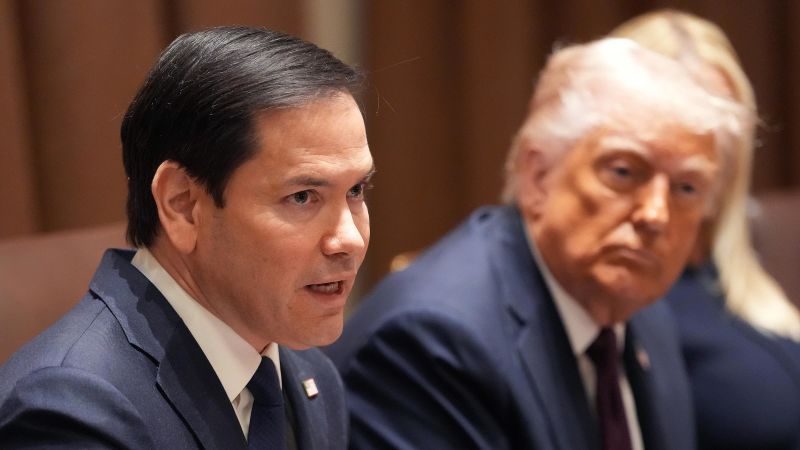CNN
—
Secretary of State Marco Rubio on Tuesday rolled out the first stage of a major plan to reorganize the US State Department with changes that will eliminate 132 domestic offices, cut around 700 positions in Washington, DC, and close offices focused on war crimes and global conflict, according to a senior State Department official and documents obtained by CNN.
The State Department argued the changes are necessary to maintain its efficacy and relevance, with a senior State Department official calling the current department organization chart “bloated” and arguing it has had a “deleterious effect on foreign policy and relevance of the Department.”
The senior State Department official said the changes wouldn’t result in immediate layoffs, but signaled that officials will lose their jobs. As part of the reorganization, 700 positions within the Washington headquarters are expected to be eliminated, the official said.
An internal State Department fact sheet obtained by CNN said that “as part of the plan, the Under Secretaries will also submit a path to reducing staff in domestic offices by 15 percent, consistent with the President’s Workforce Optimization Initiative.”
The long-anticipated reorganization proposal revealed Tuesday does not go into granular detail. The senior State Department official instead described it as a “roadmap.” Undersecretaries of state have been tasked to develop plans within 30 days for leadership to implement the changes by July 1, according to a memo that Deputy Secretary of State Christoper Landau sent to the workforce Tuesday.
The goal is for the department to be reorganized in a way that is “structurally in line” with what the administration wants to accomplish, the official said. The changes would bring the number of offices at the department’s headquarters from 734 to 602 — a 22% reduction. An additional 137 offices will be transitioned “to another location within the Department to increase efficiency,” according to the fact sheet.
“Today is the day. Under @POTUS’ leadership and at my direction, we are reversing decades of bloat and bureaucracy at the State Department. These sweeping changes will empower our talented diplomats to Put America and Americans first,” Rubio posted on X.
The reorganization plan focuses on the domestic offices to start. The proposal has been developed since the early days of the Trump administration within the State Department.
“DOGE was not in charge of this,” State Department spokesperson Tammy Bruce said Tuesday, referencing the Elon Musk-backed Department of Government Efficiency, which has led massive cuts throughout the federal government.
It does not mark the only changes the department is expected to make — particularly when it comes to overseas posts.
According to an internal FAQ memo, “no embassy, consulate or overseas post closures have been made at this time.”
Rumors about the proposed changes had stirred fear and anxiety among the State Department workforce, especially after the dramatic moves to shutter the US Agency for International Development, or USAID. The State Department reorganization is separate but “highly complementary” with the work to fold USAID under the State Department, the internal FAQ memo said.
Still, a proposed new organizational chart released by the department and the internal fact sheet outline broad changes at the US’ diplomatic agency. The Undersecretary of State for Civilian Security, Democracy, and Human Rights is eliminated, as is the Office of Global Criminal Justice and the Bureau of Conflict and Stabilization Operations. The offices that focus on refugees, religious freedom and combatting human trafficking are moved under the Office of the Coordinator of Foreign Assistance and Humanitarian Affairs. It also shows the creation of an assistant secretary for emerging threats.
“Each of the regional bureaus will create an Office of Assistance that coordinates aid for the bureau,” the fact sheet says, reflecting the upcoming closure of USAID.
The senior State Department official said Congress had been informed of the intended changes at the agency. The Republican chairman of the House Foreign Affairs Committee, Rep. Brian Mast, applauded the proposed overhaul, saying in a statement that it will make the State Department “leaner and meaner and ensure every dollar and diplomat puts America First.”
Sen. Jeanne Shaheen, Democratic ranking member of the Senate Foreign Relations Committee, noted that “any changes to the State Department and USAID must be carefully weighed with the real costs to American security and leadership.”
“When America retreats — as it has under President Trump — China and Russia fill the void. A strong and mission-ready State Department advances American national security interests, opens up new markets for American workers and companies and promotes global peace and stability,” she said in a statement. “It remains to be seen how the administration’s latest proposals will achieve that goal.”
“I will be scrutinizing these proposed reforms, which must be done with close consultation with Congress and in compliance with the law … and I will hold Secretary Rubio to his pledge to appear before our Committee and engage with Congress on the future of the State Department,” she said.
This story has been updated with additional details.

